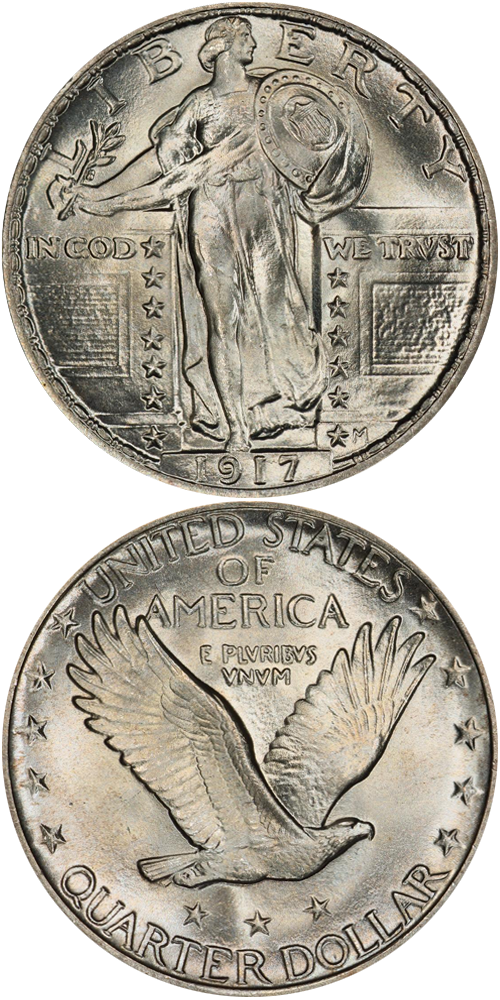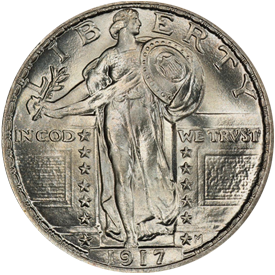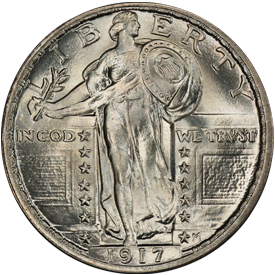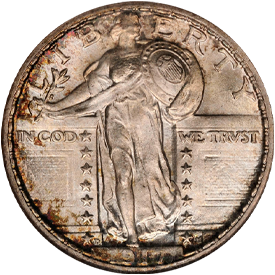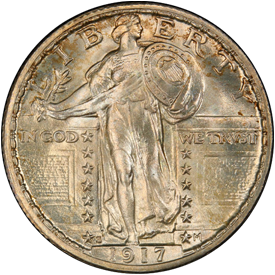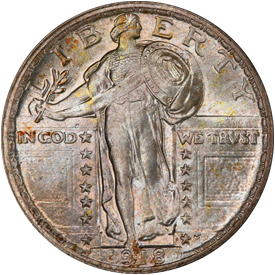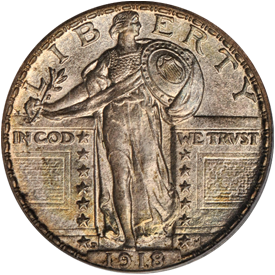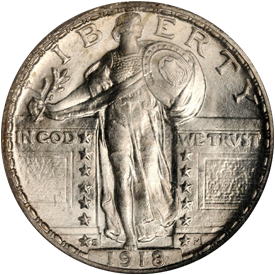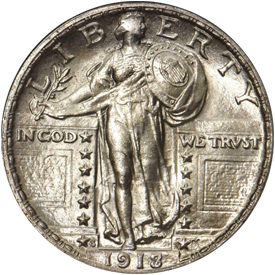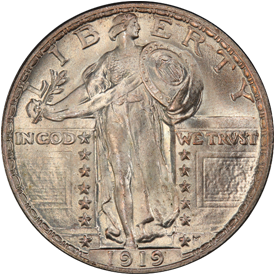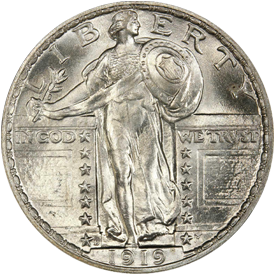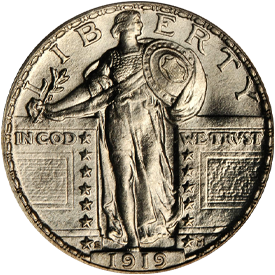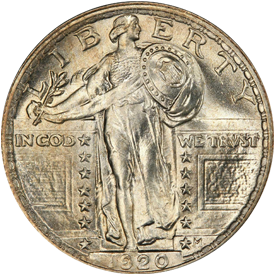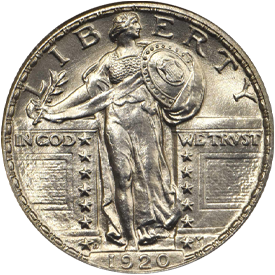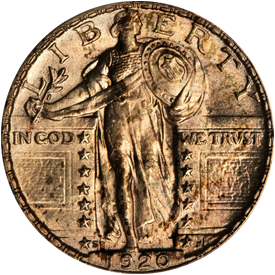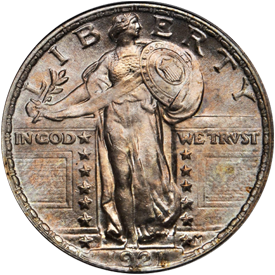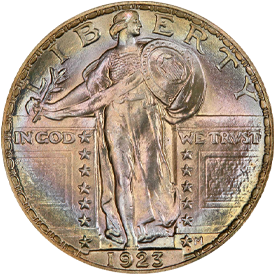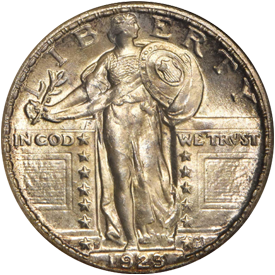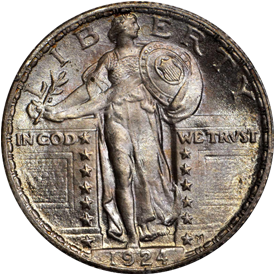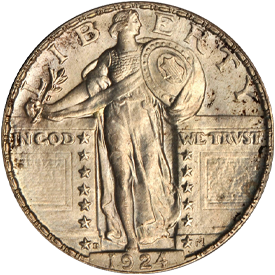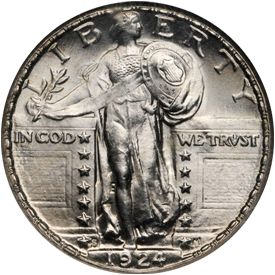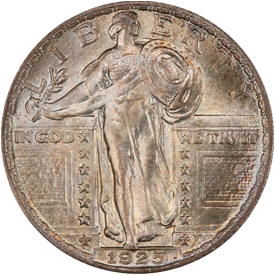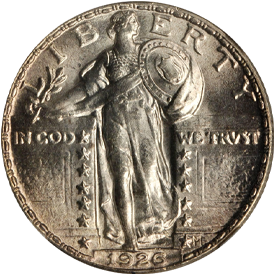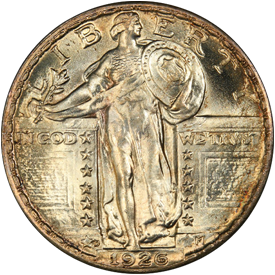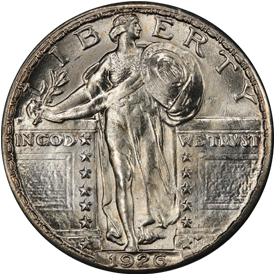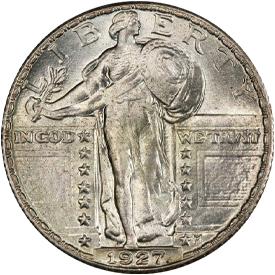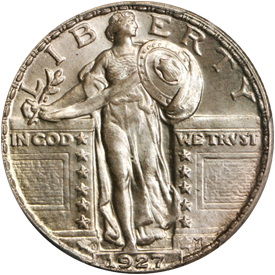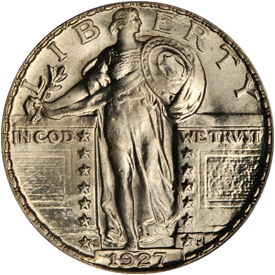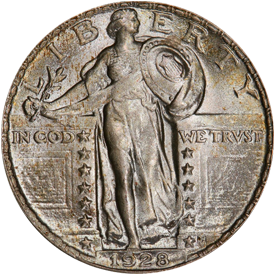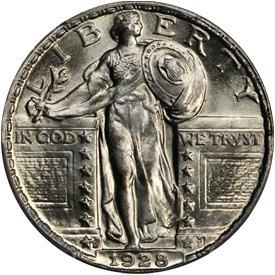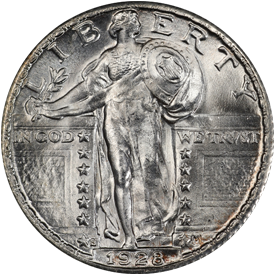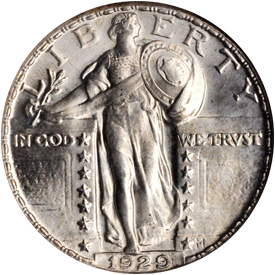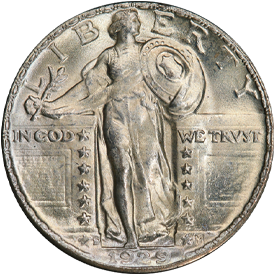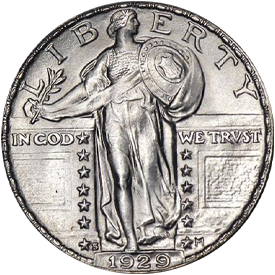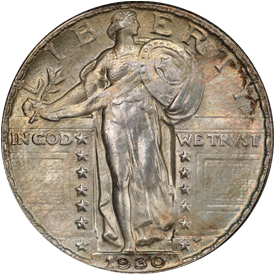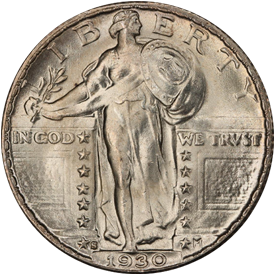Designed by: Hermon A. MacNeil
Issue Dates: 1917-1930
Composition: 90% silver, 10% copper
Diameter: 23.4 mm
Weight: 6.25 grams (96.45 grains)
Edge: Reeded
Business Strike Mintage: 214,516,400
Proof Mintage: None
Complaints arose concerning the exposed right breast of Miss Liberty, so partway through 1917 the design was changed. The new Miss Liberty now appears safely and nearly completely encased in a suit of armor or mail, perhaps a classic situation of overcompensation! The date, high on the pedestal below Miss Liberty, was continued in this position, but later, in 1925, this portion of the coin was recessed, to minimize the effects of wear. The reverse was restyled in 1917 and in its new form the eagle is higher and more centered on the coin, with three stars below the eagle and five to each side. The so-called Type II quarter was produced from 1917 through 1930, continuously except for the year 1922. Although Congress earlier mandated that coining design should not be changed more often than each 25 years, by the early 1930s it was decided to discontinue the Standing Liberty motif in favor of a new design.
The collector will have no difficulty acquiring specimens of commoner dates of the 1917-1930 era in any desired condition from Good to AU. Uncirculated pieces are readily found, particularly of dates from 1925 through 1930. Uncirculated pieces with sharply struck details at Miss Liberty's head (referred to as “Full Head”) and also on the highest part of the shield are quite elusive, and for some issues (such as 1926-D) are very rare. Such pieces command a sharp premium over normal Uncirculated coins. No Proofs were minted during this span.
Full Head
Herman MacNeil’s full figure of Liberty striding forward with a shield and olive branch is an iconic design, and one of the most beautiful and admired seen on U.S. coinage. Unfortunately, the fine details of Liberty’s head were prone to weakness, and sometimes appear flat or even “dished” in some cases. Because this aspect of the design added a great deal of beauty to the coin, it was recognized quickly by collectors, and by the early 1950s, small premiums were being paid by collectors for Standing Liberty Quarters with fully-struck head details.
When the two major grading services opened, “FH” or Full Head were added to the grade of Standing Liberty Quarters that met the qualifications. Note that the three leaves on her head, as well as the complete hairline behind her eye must show. So important is this attribute that coins without a full head are sometimes sold and advertised as 50% or up to 95% Full Head.

Further Reading
Midway through 1917, in reaction to a public outcry over Miss Liberty’s paucity of clothing, she was given a chain mail breastplate which soothed the situation. In addition, the eagle on the reverse was raised closer to the center, and three stars now appeared beneath.
After the initial 1917 Type I issues, striking became indifferent, and Denver Mint coins in particular are often quite flat. Sharply struck, full head pieces of 1918-D, 1919-D, and 1927-D are rarities. Even rarer is the 1926-D, with typical specimens lacking virtually all of the head detail. Coincidentally, the 1926-D happens to be the most plentiful issue of the series so far as the population of Uncirculated pieces is known. Also, extremely rare sharply struck, and with a full head, are such issues as 1918/7-S (rare in any grade), 1921, 1924-D (the top part of the date is nearly always weak), 1927-S, 1928-S, and 1930-S. One leading scholar looked for years and was not able to find a single 1930-S with a full head, and yet in my auction sales over the years I have had several. This goes to show that numismatic research findings can be inconsistent.
It is sometimes the case that a coin can have a full head but be weak in other areas. The previously-noted 1924-D is an example, but an even better example is afforded by the scarce 1921 date. I have seen a number of these with full heads but with weakly impressed dates.
When seeking sharply struck Standing Liberty quarters, here are the key points to check: fullness of the head (the standard benchmark), sharpness of the date, particularly the top part of the date, sharpness of the rivets on Miss Liberty's shield, and sharpness of the eagle's breast. Building a complete set of Standing Liberty quarters from 1916 through 1930 with each and every issue being sharply struck in every detail is a practical impossibility. Theoretically it can be done, but no one has ever done it and that includes a generation or two of numismatists before you and me; people who had access to many more pieces than we had. So, in order to maximize your enjoyment of collecting Standing Liberty quarters, do not be too "fussy'' about striking.
Among 20th-century issues, Standing Liberty quarters are unique in that no Proofs of any date were ever struck for collectors. I have seen scattered 1916 and 1917 Type I pieces which were offered as "Proofs" by hopeful sellers, but to my eye these pieces were simply Uncirculated coins with the matte-like surfaces which characterize certain business strikes of 1916 and 1917 in the various silver series.
The design of the first several years of the series is such that the date numerals are on a high part of the features and were one of the first areas to receive wear. In 1925 the date position was recessed, thus protecting the numerals. It is therefore common to see quarters of the 1916-1924 years with features that would otherwise grade Very Good or Fine but with the date so worn as to be almost or completely invisible.
With the exception of the 1918/7-S overdate, specimens of the various date and mintmark varieties are readily obtainable in lower grades. However, the supply of pieces is so widespread that probably the best part of a year would be required to assemble a set in Uncirculated grade, without respect to whether or not the pieces had full heads.
Over the years Standing Liberty quarters have been favorites of collectors. One enthusiast, J.H. Cline, an Ohio dealer, wrote a book on them. To me the design seems to symbolize the "spirit" of the late teens and the Roaring Twenties – and all sorts of things such as World War I Liberty bond subscription drives and the colorful posters relating to the conflict (James Montgomery Flagg's "I WANT YOU!" being the most famous), Maxfield Parrish prints, Saturday Evening Post covers, Duesenberg automobiles, Florida land speculation, dizzying profits in the stock market, Vanity Fair magazine, flappers, the Charleston, Prohibition and bathtub gin, and a dozen and one other things from this era, some images of which are known to me through one of my favorite books, Only Yesterday, by Frederick Lewis Allen, which, by the way, I recommend highly.
Beauty is in the eye of the beholder, and apart from any related romantic historical connotations, the issue is one of the most attractive in American coinage, in my opinion. It is at once classic and elegant. The Numismatist in May 1917 published an article which noted in part:
“Mr. MacNeil's 'Liberty' on the new quarters is indeed a beautiful piece of work. The idea conceived by the artist is highly expressive of national sentiment. The figure comes down a flight of steps in an attitude of welcome to the world. In one extended hand she holds a laurel branch of peace, on the left arm she carries a shield. Though she offers peace first she is prepared to defend her honor and her rights. The design suggests a step forward in civilization, protection, and defense with peace as the ultimate goal. As for the coin girl, her pride is just what you would expect to find in a wholesome, ambitious young woman upon whom this honor had been placed.”
The article further noted that Dora Doscher, who modeled the design, was at the time 22 years of age, 5' 4½" high, and represented the “most perfect type of American womanhood.” As if it made a difference, readers perhaps were cheered to note that “her days are spent in artistic and intellectual pursuits; she is a lecturer, scenario writer, and trained nurse.”
1930 saw the last minting of the Standing Liberty design, thus bringing to a close one of the shortest-lived designs in American coinage history. 1930 also brought the close of an era. Ahead were the years of the Great Depression, different national priorities, what amounted to a restructuring of the government, a widespread expansion of the coin hobby, and many other things. America would never be the same.
